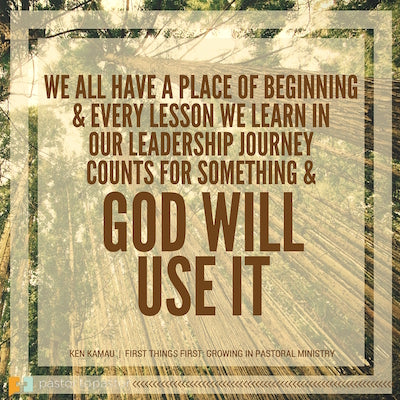 Every one of us at one point or another will have to stand and face our Goliath.
Every one of us at one point or another will have to stand and face our Goliath.
The moment you decide to step out of the crowd and follow Christ not only as a disciple but to publicly declare the message of the cross, you enter a battle zone. There you will meet your Goliath who hates everything you love and is determined to ensure that you do not achieve anything of significance in the kingdom.
We all have different Goliaths: some struggle with pride, love for money, lust, women, men, greed, fear, low self-esteem, self-righteousness – the list goes on. I am sure we all can put a finger on something we struggle with.
Whatever it is, you need to face it at some point.
It is paramount that you fight this battle while in your early stages of ministry, in your village, surrounded by people who know you authentically, where you can be challenged, wounded, or even struck, but can fall into the loving arms of family.
If you do not fight this battle in your village you will have to fight it later in life when the stakes are higher. There is no avoiding such battles. If you fail then, you will be embarrassed, your immediate family will be devastated, those that you lead will be broken, and the many lives you have touched or influenced for Christ will be shattered.
When it comes to fighting these battles, there are two things that I learnt in my village. The first is that we must learn to focus on God and not on our ability.
Do not underestimate or overestimate your ability. David acknowledged that it was God who would deliver him from the hands of Goliath. Where did David learn this? It must have been one of the lessons he learnt when looking after his father’s sheep in his village (1 Sam 17:34–37).
Remember we all have a place of beginning and every lesson we learn in our leadership journey counts for something and God will use it.
It was in the serene mountainsides of Bethlehem that David saw God deliver him from a lion and a bear. He realized that he had not overcome them by his own power but that God had made it possible. So when talking to Saul David continually uses the phrase, “the Lord who delivered me from this and that will deliver me”.
God through various circumstances had developed David to a place where he totally depended on him. While the other soldiers saw how big Goliath was (1 Sam 17:11), David saw the greatness and faithfulness of God. While the soldiers remembered the fighting history of Goliath (a warrior from his youth) and the stories they had heard about his ruthlessness with his enemies, David recalled God’s faithfulness when he faced the lion and the bear.
We need to look at the various things we face in our lives as pastors. These include pride, sexual sins, habitual sins and many more. Some pastors are so ashamed and afraid of fear of failure or discovery that they decide just to let the current carry them on. But what you need to do is to remember the different situations you have been in and how God rescued you. If he did it then, he will do it again.
Remember that we all who are now children of God were sinners at one point and are now children of God by grace alone (Rom 5:8). God’s love for you is unconditional and he is more concerned about your soul than your leadership position or fame in ministry. So as you fight your Goliaths, focus on the fact that God loves you unconditionally and there is no sin so great that he cannot forgive it.
“If we confess our sins, he is faithful and just and will forgive us our sins and purify us from all unrighteousness.” (1 John 1:9)
— by Kam Kamau, adapted from his new book First Things First: Growing in Pastoral Ministry.
How to Use This Book
New and young pastors: This is the book Ken Kamau wished had existed when he was starting out in ministry. This is a primer for starting out your ministry on a strong foundation. See how to learn from mistakes and from successes; see how to build and safeguard a strong marriage; learn how to be led and how to lead.

